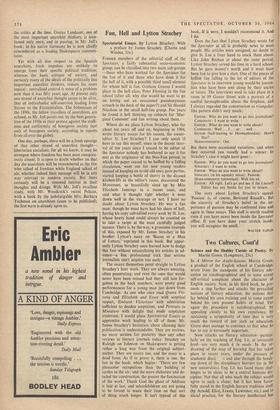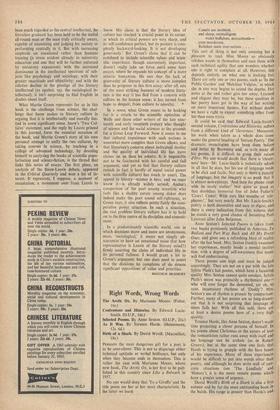Two Cultures, Cont'd
Science and the Shabby Curate of Poetry. BY Martin Green. (Longmans, 25s.)
IN A Mirror for Anglo-Saxons, Martin Green, a product of the English school at Cambridge, wrote from the standpoint of his literary edu- cation an autobiographical and to some extent self-critical complaint about the character of English society. Now, in his third book, he pro- ceeds a step further and attacks the prevailing notions of literary education, the notions that lay behind his own training and to some extent behind his own present habits of mind. For again the procedure is autobiographical; by appealing closely to his own experience, by sustaining a scrupulosity of tone that is very much the reward of just such an education, Green does manage to convince us that what he has to say is extremely important.
Now attacks, on literary education—particu- larly on the teaching of Eng. Lit. at university level—are very much a la mode. In the re- drawing of the map of learning that has taken place in recent years, under the pressure of
academic disci 7s and also through the break- ing down of the disciplinary barriers (as in the new universities), Eng. Lit. has faced many chal- lenges to its claim to be a central humane dis- cipline. Not that all who teach the subject would agree to such a claim; but it has been force- fUlly stated in the English literary tradition itself (by Arnold, Eliot, Leavis, Lawrence, etc.) and in social practice, for the literary intellectual has
been much regarded as the central intellectual, the literature graduate has been held to be the useful all-round man or the man truly critically aware, capable of examining and judging his society or performing centrally in it. But with increasing emphasis on vocational rather than humane training (a stress evident already in university education and one that will be further enforced by university expansion); with the increased dominance in the intellectual spectrum of sub- jects like psychology and sociology, with their greater exactitude and objectivity; and with the relative decline in the prestige of the literary intellectual (as against, say, the sociological in- tellectual), it isn't surprising to find English in doubts about itself.
What Martin Green represents for us in this book is the challenge from science, the chal- lenge that Snow makes to literary culture in arguing that it is intellectually and morally lim- ited in some significant sense. Snow's 'Two Cul- tures' statement, and the reply by Leavis printed in this journal, form the essential occasion of the book, and Martin Green's story of his own personal attempt to unify the two cultures, by taking courses in science, by teaching in a college of advanced technology, by devoting himself to analysing the books of scientific popu- larisation and science-fiction, is the thread that links this series of essays. The first piece, an analysis of the Snow-Leavis debate, appeared in the Critical Quarterly and won a lot of in- terest. It represents, I suppose, a mothent of recantation, a movement over from Leavis to
Snow. His claim is that the literary idea of culture has reached 'a crucial point in its career, at which its critical powers are very sharp, and its self-confidence perfect, but its posture is com- pletely backward-looking. It is not developing generously.' But Green's claim that it can be redefined to include scientific values and scien- tific experience, though enormously important, doesn't really take on force until some later essayt, where he expands his concept of a more eclectic humanism. He sees that the lack of generosity of literary culture is more complex than he proposes in this first essay; after all, one of the most striking features of modern litera- ture is the way it has fled from a concern with culture in the human sense; it has turned from hope to despair, from culture to anarchy. •
In a sense, what Green seems to be looking for is a return to the scientific optimism of Wells and those other writers of the late nine- teenth and early twentieth century who thought of science and the social sciences as the grounds for a Great Leap Forward. Now it seems to me that cultural impatience with such notions is somewhat more complex than Green allows, and that literature's, concern about individual destiny and the quality of individual life has more claims on us than he admits. It is impossible not to be fascinated with his careful and full argument, and yet to feel that literary culture (which in fact is hardly of equal social power with scientific culture) has much to assert. The appeal to history—science is here, and we must know it—is already widely served; Auden's comparison of the poet among scientists who feels like a shabby curate among dukes does indeed make the poet sound self-righteous, as Green says; it also reflects pretty fairly the com- parative power situation. In such a situation, the real problem literary culture has is to hold on to the firm centre of its discipline and commit- ment.
In a predominantly scientific world, one in which decisions more and more are anonymous, mass, 'sociological,' it seems not simply ob- scurantist to have an occasional voice (for how representative is Leavis of the literary mind?) firmly asserting the claim of individual life in its personal fullness. I would grant a lot to Green's argument; but one does need to assert that the divisions he complains of do denote significant oppositions of value and priorities.
MALCOLM BRADBURY



































 Previous page
Previous page